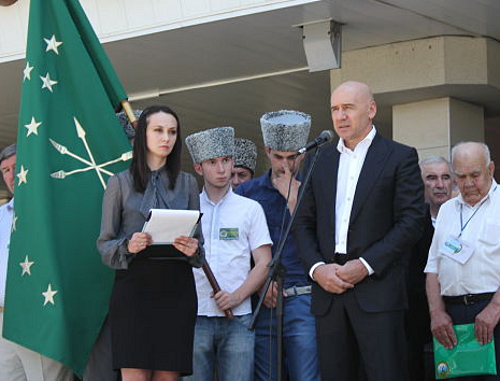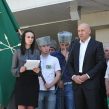
Circassian Activist Says Protests Are Instrumental in Resolving Circassian Issues
By:

On June 29, a conference in support of the Syrian Circassians took place in Nalchik, Kabardino-Balkaria. The participants in the conference demanded that Moscow relax visa rules and simplify the granting of refugee status to Circassians from Syria, who have reportedly experienced extreme hardship there since the start of the Syrian civil war. The head of the Circassian organization Khase in Syria, Akram Iskhak, said at the conference that about 2,000 Circassians want to leave the country but “do not have money not only for travel, but even for food.” The head of the Circassian Khase organization in Jordan, Samir Kardan, said that about 5,000 Circassian refugees had gone to Jordan and that the Jordanian Circassians had resettled all of them in private homes. Speaking at the same conference in Nalchik, a Circassian activist from Turkey, Shigaluga Uajit, said Circassians should not send assistance to Syria because it would not reach the Circassians there. Instead, Uajit called on the Circassians to concentrate their efforts on repatriating their ethnic brethren to their historical homeland in the North Caucasus (https://www.kavkaz-uzel.ru/articles/226468/). Concurrently with the conference, Circassian activists organized a telethon on behalf of the Syrian Circassians. The event raised about $60,000, and the organizers said they would continue the campaign until the end of the year (https://aheku.org/page-id-3593.html).
The International Circassian Association was the primary organizer of the conference on the Syrian Circassians held in Nalchik. This organization is known for being close to the Russian government, but still it put forward very far-reaching demands to alleviate the hardships of the Syrian Circassians. The conference regurgitated the fact that the issue of repatriating Syrian Circassians to the North Caucasus became a focal point for unifying all Circassian forces, whether they are close to the government or independent.
Inal Gashokov, a member of the Public Chamber under the auspices of Moscow’s envoy to the North Caucasus, highlighted the internal contradictions in the Russian government’s reasons for keeping the Syrian Circassians out of the North Caucasus. Current Russian law allows a simplified procedure for repatriating descendants of those who lived in the USSR and Russian Empire. However, Russian government officials recently stated that the Circassians were not subjects of the Russian Empire prior to Russia’s conquest of the Circassian areas in 1864. Gashokov noted that all three republics of the North Caucasus with a Circassian population—Kabardino-Balkaria, Karachaevo-Cherkessia and Adygea—celebrated the 450th anniversary of the “voluntary accession” of Circassian regions to Russia. The celebrations were financed by the Russian government in 2007 through special decrees signed by President Vladimir Putin (https://www.kavkaz-uzel.ru/articles/226468/). So, apparently for Russian propaganda purposes, the Circassians joined the Russian Empire voluntarily, but for the purposes of helping the Circassians’ descendants in Syria, historical Circassia in the Caucasus was conquered by Russia through military force and therefore, the Syrian Circassians have no rights to claim special privileges to acquire Russian citizenship. Needless to say, such inconsistent Russian government positions raise many questions among the Circassians.
The Circassian academician and expert Naima Neflyasheva said the Russian government’s inaction and the Circassian organizations’ complicity are likely to result in the rise of grassroots activism among the Circassians in Russia and beyond. According to Neflyasheva, Circassian activists do not pose security risks to the Olympics in Sochi in 2014, but they do pose “reputational risks,” as Circassian youth will organize street protests (https://rus.ruvr.ru/radio_broadcast/104022426/225223614/).
The Russian government has evinced little flexibility not only on allowing Syrian Circassians to seek refuge in Russia, but also on protecting Syrian Circassians who have escaped the civil war there. The hopes of Circassian activists that the Russian government would extend protection to students from Syria were dashed at the end of June, when the Russian Ministry of Education failed to include 132 students from Syria who are attending universities in Kabardino-Balkaria and Adygea in the government’s quotas for international students. They face removal from the country at the beginning of July.
Circassian activists received this news with outrage. One of them, Ruslan Achmiz, told Ekho Kavkaza radio: “If this is a systematic policy targeting my people, it should end, especially in anticipation of the Olympiad. While we are trying to repatriate our people to their homeland, local xenophobes are attempting to deport them back, only it is unclear, to where? Did anybody think about where these 18-year-old children, girls, will go? It is easy to say deport everyone.” In particular, the Circassian activist singled out Russian Minister of Education Dmitry Livanov, calling him a “xenophobe” and proposed that the republican parliaments in all three Circassian republics address Russian State’s Duma to call for Livanov’s removal. “If our deputies do not want or it is too hard for them to raise this issue in the parliament, I call on the civil organizations and ordinary people who are not indifferent to come out into the streets with protests and demands,” he said. “Then, it will be easier for our deputies and for the Duma [to raise the issue of the minister’s removal]” (https://www.ekhokavkaza.com/content/article/25031311.html).
Circassian activists appear to have concluded that civil protests are instrumental to achieving any positive results in the dialogue with Moscow. It will not take long for the Circassians in the North Caucasus to realize that the run-up to Olympics in Sochi is the most opportune time to make the world and Moscow hear their voice—and that the Kremlin is finding it extremely difficult to continue to ignore this topic.




